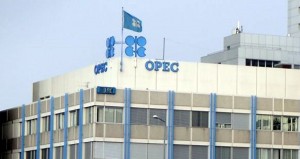 OPEC figures show drops in output and price of Iranian oil for January 2015.[/caption]
OPEC figures show drops in output and price of Iranian oil for January 2015.[/caption]LONDON, March 18 (Reuters) - OPEC efforts to bring non-member countries such as Russia�on aboard in cutting output have made little progress, officials say, and even the chance of more Iranian exports hitting prices if sanctions end is unlikely to boost cooperation.
Since the oil price collapse, top OPEC exporter�Saudi Arabia�has said it wanted non-OPEC producers to cooperate with the group. But a plan for a meeting between the two sides this month appears to have been shelved.
"At first we have been planning to meet in March, but so far no-one has come forward with such an initiative. The situation has calmed down a bit," Russian Energy Minister Alexander Novak told Reuters.
Novak was part of a Russian delegation that held talks with OPEC ministers before OPEC's November meeting. But no supply cut deal was reached then, OPEC refused to act alone and�Brent crude�prices fell, reaching a near six-year low close to $45 in January.
The Organization of the Petroleum Exporting Countries' position, according to a delegate from a Gulf producer, remains that it might consider cutting output if outside producers were willing to contribute.
"If big non-OPEC producers are willing to cooperate effectively, not only by saying but effectively, to make plans to decrease production, here OPEC may take a decision," the delegate said.
Algerian Energy Minister Youcef Yousfi, who in 1998-1999 helped organize OPEC and non-OPEC production cuts that revived prices from a slump to $10, has again been seeking more co-operation among exporters.
The issue could rise up the agenda for producers if Iran and world powers reach a deal on Iran's nuclear work that paves the way for higher Iranian oil supplies, and further weakens prices. Crude has been falling this week on the prospect of a deal.
Iran has made clear it expects other producers inside and outside OPEC to make room for an increase in its supplies, once sanctions are lifted. Iran was OPEC's second-largest producer until 2012, when sanctions forced it to cut exports.
"When we lost our market some countries filled the gap, so when Iranian oil comes back to the market it's time to accommodate it for the benefit of all sides," said a source familiar with Iranian oil policy.
But analysts doubt�Russia�would be willing to change its tune on output curbs and that other OPEC members would give up market share to make room for Iran, given that�Iraq wants to boost exports and�Saudi Arabia�is focusing on market share.
"If the nuclear deal happens and Iran increases exports, the market will have to simply accommodate those volumes," said a long-time OPEC watcher. "I can't see anyone - be itSaudi Arabia,�Iraq�or�Russia�- agreeing to cut their own output."
Olivier Jakob, oil analyst at Petromatrix, said a boost in Iranian exports would add to OPEC's challenge in working together as a 12-member group and doubted�Russia�would be willing to limit supplies.
"Some have described the OPEC November meeting as the death of OPEC and it is true that the lifting of sanctions on Iran will create a major issue for�Saudi Arabia, Kuwait and the UAE," he said.
"They already have an issue with�Iraq�increasing production and they will now have to face Iran that will consider itself, like�Iraq, not bound by any quota for many years."
OPEC holds its next meeting in June and so far looks set to keep policy unchanged. As in November, Russian officials are also expected to travel to Vienna for the meeting.
By Reuters










